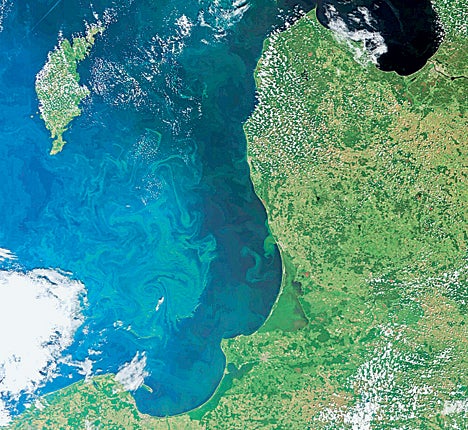Evil weed in Baltic Sea puts marine life at risk

Your support helps us to tell the story
From reproductive rights to climate change to Big Tech, The Independent is on the ground when the story is developing. Whether it's investigating the financials of Elon Musk's pro-Trump PAC or producing our latest documentary, 'The A Word', which shines a light on the American women fighting for reproductive rights, we know how important it is to parse out the facts from the messaging.
At such a critical moment in US history, we need reporters on the ground. Your donation allows us to keep sending journalists to speak to both sides of the story.
The Independent is trusted by Americans across the entire political spectrum. And unlike many other quality news outlets, we choose not to lock Americans out of our reporting and analysis with paywalls. We believe quality journalism should be available to everyone, paid for by those who can afford it.
Your support makes all the difference.Record summer temperatures, farm fertilisers and a lack of wind have created a gigantic carpet of evil-smelling weed covering large areas of the Baltic and threatening both marine life and seaside tourism, scientists warn.
The 377,000 sq km of blue-green algae, covering an area the size of Germany, has been identified by satellite cameras. It extends from Finland along the south coast of Sweden and surrounds the Danish island of Bornholm.
Scientists from the German section of the World Wide Fund for Nature in Hamburg have warned of the damaging effects of the weed. "These huge algae carpets hit the marine environment most," said Jochen Lamp, a WWF project spokesman. "They kill plants and encourage the spread of dead zones on the sea bed which have no oxygen left in them."
Blue-green algae, which often smell of rotten eggs, can also harm humans as they contain cynanobacteria, which can produce skin rashes and other allergic reactions as well as poisons that damage the liver. Doctors warn that drinking water contaminated with the algae can cause severe diarrhoea.
The current algae explosion in the Baltic is the largest since 2005 and has been encouraged by daytime temperatures of up to 38C, light winds and an absence of waves, which normally help to break up weed carpet.
Scientists say one of the main causes of blue-green algae is over-fertilisation of farmland, leading to large quantities of phosphorous and nitrogen being washed off the land and into the Baltic from rivers. They say that under the right climatic conditions a weed explosion is inevitable. "Over-fertilisation is the biggest environmental problem facing the Baltic; it is the driving force behind the spread of dead zones on the sea bed," Mr Lamp said.
The WWF has criticised countries with a Baltic coastline for agreeing on ambitious targets for reducing over-fertilisation while also encouraging farmers to use more fertilisers.
In Germany, where several Baltic beaches were closed in 2001 because of algae, coastguards have already warned bathers not to going swimming if the sea water is contaminated.
Join our commenting forum
Join thought-provoking conversations, follow other Independent readers and see their replies
Comments